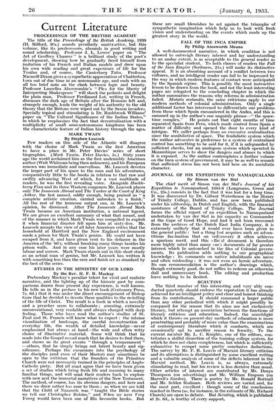_ By Stephen Leacock
Few readers on this side of the Atlantic will disagree With the choice of Mark Twain as the first American to have a place in Mr. Peter Davies' series of short biographies. (Mark Twain. Peter Davies, 5s.) Sixty years ago the world acclaimed him as the first undeniably American author (Walt Whitman being then unknown), and his European renown was immediate and marvellous. Mr. Leacock devotes the larger part of his space to the man and his adventures, comparatively little to the books in relation to that raw and swiftly advancing West of which, for a vast multitude of readers, he was the first revealing voice. Alongside Huckle- berry Finn and its three Western congeners Mr. Leacock places only The Innocents Abroad and The Yankee at the Court of King Arthur, the last named, oddly enough, being praised as "a complete artistic creation, carried unbroken to a finish." All the rest of the immense output can, in Mr. Leaeock's opinion, be dismissed. After The Innocents Abroad Mark Twain became an American institution a national legend. We are given an excellent summary of what that meant, and of the manner in which Mark Twain was compelled to exploit it when financial disaster fell upon him at sixty-five. Mr. Leacock accepts the view of all later American critics that the household at Hartford and the New England environment made a prison for Mark Twain's genius. He could not have escaped from it, and have given vent to his defiance in the America of the '80's, without breaking many things besides his prison walls. And in any case his later years were mostly labour and sorrow. Mark Twain stands out in this short study as an actual man of genius, but Mr. Leacock has written it with something less than the care and finish set as standard by the best of the series.




































 Previous page
Previous page